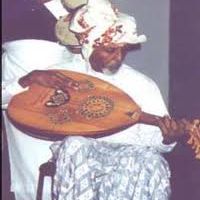Abdullahi Qarshe: Difference between revisions
ClueBot NG (talk | contribs) m Reverting possible vandalism by The reality live to version by Kzl55. Report False Positive? Thanks, ClueBot NG. (3850871) (Bot) |
No edit summary Tags: Visual edit Mobile edit Mobile web edit |
||
| Line 25: | Line 25: | ||
==Biography== |
==Biography== |
||
Qarshe was born in 1924 in the Somali [[expatriate]] community in [[Moshi, Kilimanjaro|Moshi]], Tanzania. He belonged to the Habar Yoonis sub clan of |
Qarshe was born in 1924 in the Somali [[expatriate]] community in [[Moshi, Kilimanjaro|Moshi]], Tanzania. He belonged to the Habar Yoonis sub clan of Moosa Arreh [[Garhajis]] [[Isaaq]] that mainly inhabits Sanaag region of Somaliland.<ref>http://www.fao.org/fileadmin/user_upload/drought/docs/Renders%20Terlinden%20Somaliland%20Statehood%202010.pdf</ref> In 1931, at the behest of his family, he left Tanzania and settled in [[Aden]], [[Yemen]] for his education. It is in Aden where Abdullahi had his first encounter with cinema and radio playing [[Hollywood|western film]]s and [[Music of India|Indian]] and [[Arabic music]], which inspired him to buy a [[lute]] to accomplish his new goal of creating music in the [[Somali language]]. He was married to Adaiya Qarshe whom he had four children with, Rukiyo Qarshe, Safiyo Qarshe, Anab Qarshe and Mahad Qarshe. |
||
Qarshe, along with other first generation artists such as [[Ali Feiruz]] and Mohamed Nahari, was among the pioneers of modern Somali music. |
Qarshe, along with other first generation artists such as [[Ali Feiruz]] and Mohamed Nahari, was among the pioneers of modern Somali music. |
||
Revision as of 14:52, 21 December 2020
Abdullahi Qarshe عبدالله قارشي | |
|---|---|
 | |
| Background information | |
| Birth name | Cabdilaahi Qarshe |
| Born | 1924 Moshi, Tanzania |
| Origin | Somali |
| Died | 1994 (aged 69–70) Tanzania |
| Genres | Balwo, Heello,[1] Qaraami |
| Instrument(s) | Oud, piano, guitar, lute |
| Years active | 1940s–1970s |
| Labels | Wadani |
Abdullahi Qarshe (Somali: Cabdilaahi Qarshe, Arabic: عبدالله قارشي) (1924–1994) was a Somali musician, poet and playwright known as the "Father of Somali music".[2] In 1957 he wrote and composed the Somali National Anthem, Qolobaa Calankeed.[3]
Biography
Qarshe was born in 1924 in the Somali expatriate community in Moshi, Tanzania. He belonged to the Habar Yoonis sub clan of Moosa Arreh Garhajis Isaaq that mainly inhabits Sanaag region of Somaliland.[4] In 1931, at the behest of his family, he left Tanzania and settled in Aden, Yemen for his education. It is in Aden where Abdullahi had his first encounter with cinema and radio playing western films and Indian and Arabic music, which inspired him to buy a lute to accomplish his new goal of creating music in the Somali language. He was married to Adaiya Qarshe whom he had four children with, Rukiyo Qarshe, Safiyo Qarshe, Anab Qarshe and Mahad Qarshe.
Qarshe, along with other first generation artists such as Ali Feiruz and Mohamed Nahari, was among the pioneers of modern Somali music. An innovative musician, Qarshe often employed a wide variety of instruments in his art, such as the guitar, piano and oud. He was also known for his poems and his theatrical work at Mogadishu and Hargeisa venues.
The Balwo genre, was however founded by Abdi Sinimo as was mentioned by Qarshe. In an interview with Abdullahi Qarshe published by Bildhaan Vol. 2 page 80, he affirmed that "modern music was in the air at the time of Abdi Sinimo, who is widely regarded as the genius who formulated and organized it into the belwo and thus took well deserved credit and honor for it."[5]
Qarshe introduced a new and shorter form of Heello by combining traditional Somali poetry with song. In the 1940s he created his first song Ka ka'ay (Arise). Qarshe utilized many of his Heello songs to express Pro-independence and anti-colonial sentiments. In tribute to Patrice Lumumba he wrote the song Lumumba ma noole mana dhimane (Lumumba is not alive neither is he dead) in 1960 . In 1957 he composed the current Somali National Anthem Qoloba Calankeeda waa cayn (Every nation has its own unique flag). In 1955 Qarshe founded the Walaalo Hargeisa troupe which performed various plays around Somalia, one of them being Soomaalidii Hore iyo Somaalidii dambe (Somalis present and past). Qarshe's 1961 song Aqoon la'aan waa iftiin la'aan(to be without knowledge is to be without light) was the signature tune of Radio Mogadishu. In addition, Qarshe was a member of the pioneering Somali musical ensemble Waaberi.[6][7][8]
See also
Notes
- ^ Ph.D, Toyin Falola; Jean-Jacques, Daniel (14 December 2015). Africa: An Encyclopedia of Culture and Society [3 volumes]: An Encyclopedia of Culture and Society. ABC-CLIO. ISBN 9781598846669.
- ^ Johnson, p.82
- ^ Turner, B. (12 January 2017). The Statesman's Yearbook 2014: The Politics, Cultures and Economies of the World, by Barry turner , p.1116. ISBN 9781349596430.
- ^ http://www.fao.org/fileadmin/user_upload/drought/docs/Renders%20Terlinden%20Somaliland%20Statehood%202010.pdf
- ^ "Interview with the late Abdullahi Qarshe (1994) at the Residence of Obliqe Carton in Djibouti". 1994.
One cannot say, therefore, that I am the "Father of Somali Music." Even modern music was in the air at the time of Abdi Sinimo, who is widely regarded as the genius who formulated and organized it into the belwo and thus took well deserved credit and honor for it.
- ^ Mukhtar, Mohamed Haji (25 February 2003). Historical Dictionary of Somalia by Mohamed Haji Mukhtar. pp. 13-14. ISBN 9780810866041.
- ^ Agency, Central Intelligence (22 November 2016). The CIA world factbook 2007, p.778. ISBN 9781510712898.
- ^ Turner, B. (12 January 2017). The Statesman's Yearbook 2014: The Politics, Cultures and Economies of the World, by Barry turner , p.1116. ISBN 9781349596430.
References
- Johnson, John William (1996). Heelloy: modern poetry and songs of the Somali. Indiana University Press. ISBN 1-874209-81-2.
